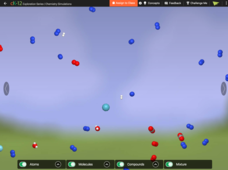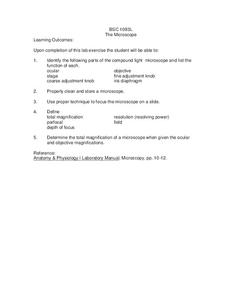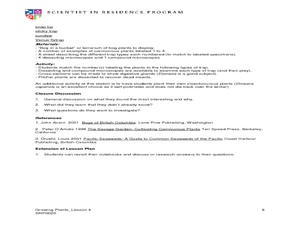Cornell University
Building a Compound Light Microscope
What better way to learn how to use a microscope than building your own? A lab investigation has scholars use lenses from magnifying glasses and sheets of cork to design their own compound microscopes. They calculate focal length...
Curated OER
18th Century Microscope
Young scholars examine a microscope from the 18th century. In this microscope lesson, students investigate how it works, what it was used for and how the tool has evolved through the years. Young scholars also build knowledge on how...
Baylor College
Tools of Magnification
Life science learners need to be able to use a microscope. With this comprehensive resource, they first experience how lenses and magnification work, and then get familiar with using a compound microscope. Tremendous background...
CK-12 Foundation
Microscopes: Focal Point
The 1590s saw the invention of the first compound microscope. Scholars learn about how microscopes work and how to properly focus one. The lesson stresses the science fields that use microscopes and the difference between electron...
Curated OER
The Microscope
Students investigate the parts and functions of a compound microscope. They explore various websites, label the parts of a microscope on a worksheet, view prepared slides, and create drawings of the prepared slides.
Curated OER
Using Microscopes In The Classroom
Get up close and personal with parts of a microscope lesson plans and activities for elementary students!
Curated OER
Parts of a Microscope
In this biology lesson, students label and identify the different parts of a microscope. They complete 16 short answer questions about each part's function and complete 12 review questions in the end.
Curated OER
The Virtual Electron Microscope
Students explore the world of the very small using a Flash plug-in Virtual Electron Microscope. They complete and discuss an activity in which unknown samples are placed under the computer simulated microscope to determine where the...
Curated OER
Exploring Microscopes
Students explore the parts of a microscope. In this microscope lesson, students examine simple and compound microscopes. Students discover how the parts of a microscope work together to generate an image.
Curated OER
Looking at French Decorative Arts: The Science of Good Design
Students examine the style of an 18th-century compound microscope and its case. In this scientific design lesson plan, students look at Jacques Caffieri's, "Compound Microscope and Case" before comparing the design to a modern...
CK-12 Foundation
Air Matters
What makes up the air we breathe? Young scientists explore the atoms and molecules in the air. An interactive lesson allows individuals to watch the movement of the particles in the air and change the makeup from a mixture to a...
Virginia Department of Education
A Crystal Lab
Young chemists grow ionic crystals, metallic crystals, and supersaturated crystals in three different lab experiments. Observing these under a microscope allows pupils to compare the various structures.
Curated OER
Microscopes: Is what you see, what you got?
Eighth graders identify the parts and functions of the microscope. For this biology lesson, 8th graders observe different samples under different types of microscopes. They compare and contrast the details they see.
Curated OER
Introduction to Biology
Students examine a microscope and learn its functions. In this microscope lesson students prepare a wet mount slide and complete calculations.
Curated OER
The Microscope
In this microscope lesson students explore the compound light microscope. Students discover techniques concerning cleaning, storage and proper use of the microscope. Students discover the working parts of the compound light microscope as...
Kenan Fellows
Microorganisms in Pond Water
That is living in the water? Groups of two to three view pond water with microscopes in order to find microorganisms. They draw pictures of the ones they find in their slides. The groups compare their drawings to pictures of common...
Curated OER
Microscopes and Telescopes
Students analyze a microscope and study what they do. In this investigative instructional activity students study how microscopes were first invented, and how ray diagrams are used in conjunction.
Curated OER
Microscopy Exercises
Students explore organisms and botany by utilizing microscopes. In this microscopic research lesson, students define many plant and organism related vocabulary terms such as conifers, moss and spores. Students view spores and other...
Columbus City Schools
To Measure its Mass or Volume?
Atoms, elements, and molecules, oh my! Teaching the fundamentals of chemistry to curious sixth graders has never been easier to accomplish. Here is a resource that pulls together everything needed to get them off to a good start,...
Curated OER
Algae Part One: An Introduction
Students have the opportunity to view two types of algae under 400x magnification with a compound microscope. They make observations and record their observations through drawings and words. In addition, they identify different qualities...
Howard Hughes Medical Institute
Small-Molecule Diversity
One way to study the microscopic is to make it macroscopic. Each slide of the lesson presentation presents a different molecular model along with a brief description of the compound's function. Learners use the information to build...
Curated OER
Size and Shape
Students observe different substances under the microscope. In this space science instructional activity, students identify the different features of SEM images. They formulate a conclusion about the images of Mars meteorites.
Curated OER
Composting in Schools: Observing Compost Microorganisms
Students explore composting. In this composting instructional activity, students use compound microscopes to observe the microbial communities in compost. Observations and documentation of changes will occur over the course of several...
Curated OER
Creating Coacervates
Students create and observe coacervates. In this origin of life lesson, students create coacervates by mixing carbohydrate and protein solutions. They observe the life-like qualities of the structures and discuss the origin of life.























